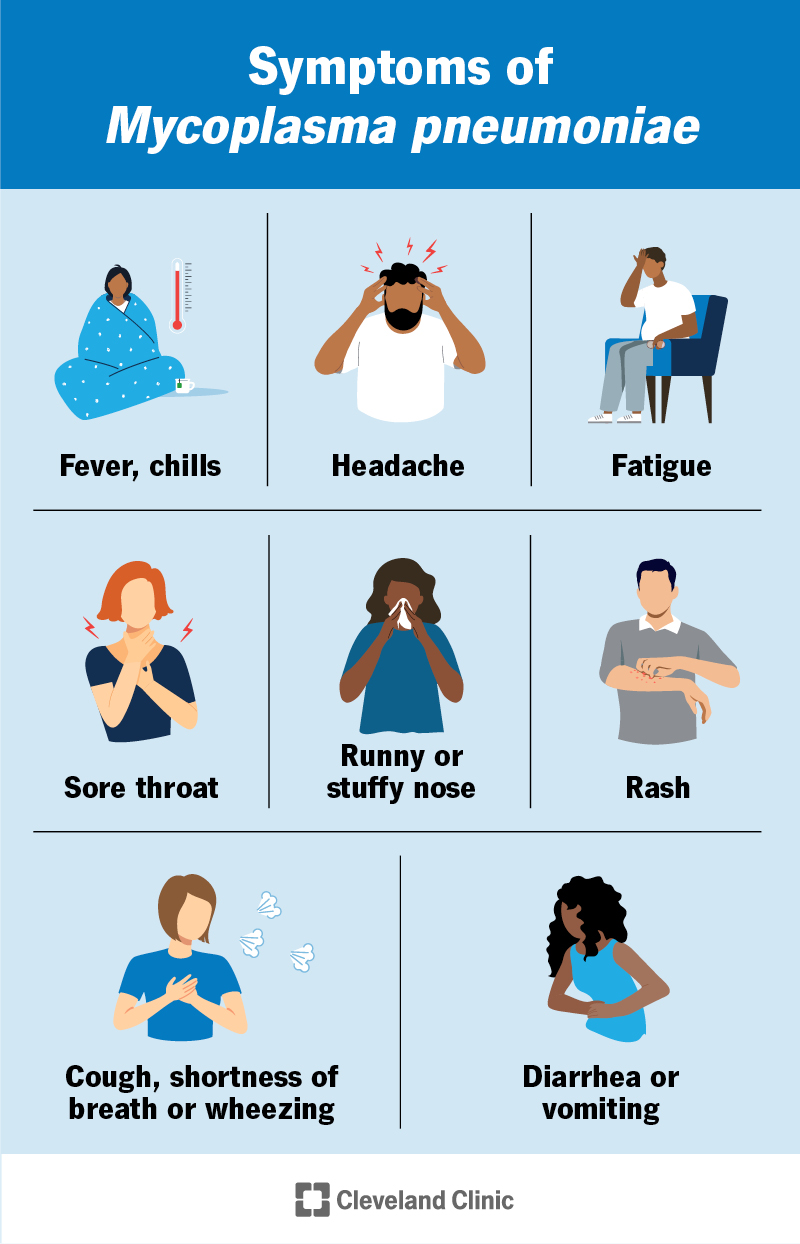Mycoplasma pneumoniae is a bacterial infection. It can cause mild, cold-like symptoms and pneumonia. Infections are most common in young adults and school-aged kids. Most cases usually get better on their own. Providers treat pneumonia and other severe symptoms with antibiotics.
Advertisement
Cleveland Clinic is a non-profit academic medical center. Advertising on our site helps support our mission. We do not endorse non-Cleveland Clinic products or services. Policy
Mycoplasma pneumoniae (M. pneumoniae) is a type of bacteria that can cause an infection in your lungs and airways. Sometimes, the infection can cause pneumonia.
Advertisement
Cleveland Clinic is a non-profit academic medical center. Advertising on our site helps support our mission. We do not endorse non-Cleveland Clinic products or services. Policy
Symptoms of M. pneumoniae infection can be mild, like a cold, even when you have pneumonia. This is why it’s sometimes called “walking pneumonia.” Sometimes, it progresses to severe complications.

Image content: This image is available to view online.
View image online (https://my.clevelandclinic.org/-/scassets/images/org/health/articles/mycoplasma-pneumoniae)
Mycoplasma pneumoniae infections usually cause mild respiratory symptoms. But sometimes, symptoms can become severe. They include:
Kids might also have digestive symptoms, like diarrhea or vomiting.
Bacteria cause Mycoplasma pneumoniae infections. They spread from person to person through coughing and sneezing. But you usually have to spend a lot of time around someone to get infected.
Outbreaks of M. pneumoniae can happen where people are living close together. Examples include:
Young adults and school-aged kids are most likely to get M. pneumoniae infections. You’re at a higher risk for serious illness if you:
Complications aren’t common but can be serious. They include:
Advertisement
Healthcare providers don’t regularly test for M. pneumoniae infections. They can use a chest X-ray to look for pneumonia. Then, they can use a nose and throat swab to determine the cause of the infection — like the specific bacterium or virus.
Mycoplasma pneumoniae usually goes away on its own. If you have pneumonia or other severe symptoms, a healthcare provider will treat you with antibiotics.
Talk to your healthcare provider if you have a long-term health condition or compromised immune system and you have signs of an infection. Go to the emergency room if you have difficulty breathing or other severe symptoms.
If you have a mild infection, it should get better on its own within two to three weeks. If your symptoms get worse or if you have other health conditions, you’ll need antibiotics to get rid of the infection.
You can reduce your risk of getting and spreading infections by:
Even though the name sounds scary, Mycoplasma pneumoniae infections usually aren’t serious. But like all respiratory infections, some cases can be serious. Don’t hesitate to see a healthcare provider if you have difficulty breathing or other serious symptoms.
Advertisement

Sign up for our Health Essentials emails for expert guidance on nutrition, fitness, sleep, skin care and more.
Learn more about the Health Library and our editorial process.
Cleveland Clinic’s health articles are based on evidence-backed information and review by medical professionals to ensure accuracy, reliability and up-to-date clinical standards.
Cleveland Clinic’s health articles are based on evidence-backed information and review by medical professionals to ensure accuracy, reliability and up-to-date clinical standards.
Cleveland Clinic’s primary care providers offer lifelong medical care. From sinus infections and high blood pressure to preventive screening, we’re here for you.
